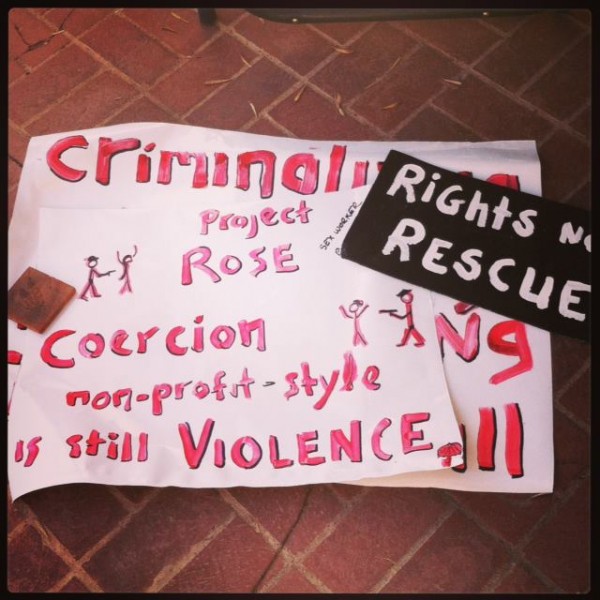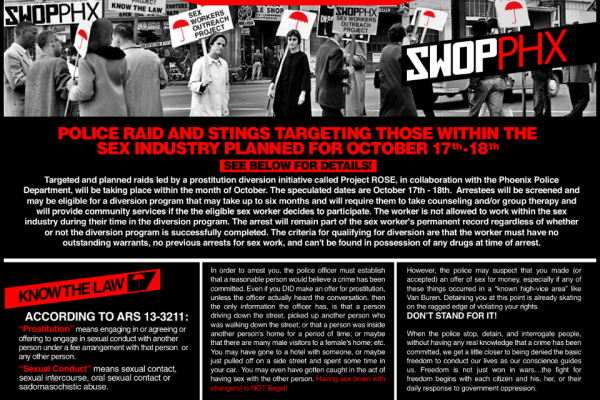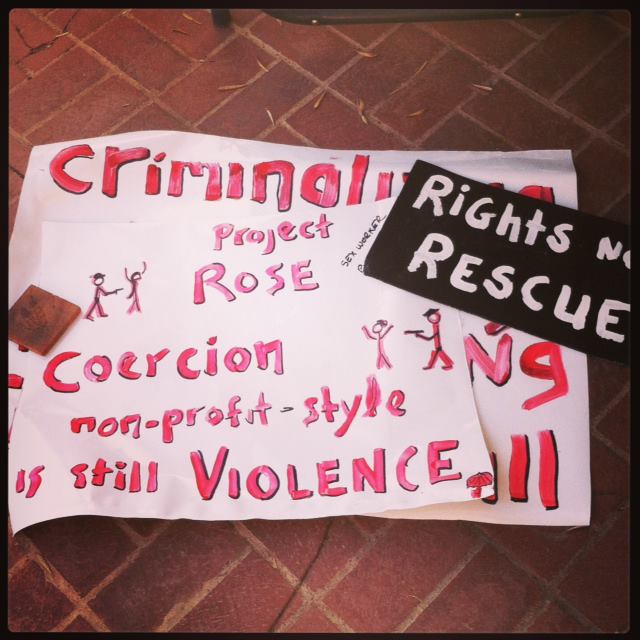
We often have cause to complain about media coverage of sex work, but we haven’t had occasion to talk about how good stories can be edited into inadequate ones as they travel from reporter to final outlet. The fate of Jordan Flaherty‘s story about Project ROSE (Reaching Out to the Sexually Exploited) is a great opportunity to look at what happens when a journalist tries to show the public the whole story but is met with resistance from his employer.
Flaherty traveled to Phoenix in October to cover ROSE and the accompanying protests by SWOP-Phoenix. ROSE is a “concentrated arrest-alternative/intervention program for adult victims of prostitution or sex trafficking.” In practice, it’s mass arrest sweeps during which those taken into custody on prostitution charges are told they can either go through ROSE, starting with a trip to their headquarters at a church, or they can go to jail. And there are problems with the process, ones Flaherty wanted to make sure his finished work represented. Al Jazeera aired a version of his television segment that eliminated key information about ROSE, so Flaherty has made repeated attempts to get a fuller version of his reporting out to the public. He has encountered difficulty in doing so. I spoke with him last week at a time when his story had been posted on Truthout, but as of yesterday, Al Jazeera America has claimed copyright violation, requiring Truthout to remove the story from their site. The story is still available in a couple of other places. Another cut of the television piece is available although it’s not one Flaherty considers complete, either. This written version of the piece as aired is the only one remaining on Al Jazeera America.
Below is an edited Q&A that took place by phone on Monday, January 6th.
How did you first come across Project ROSE?
The issue of the legal treatment of sex workers is something I’ve been following for a while, especially these kinds of programs that say that they’re helping sex workers but are doing mass arrests. These programs have been getting very positive treatment and I was interested in looking at something like that with a more critical eye. When I heard about Project ROSE it just seemed like an example of the way in which people are conflating sex work and trafficking.
Did Project ROSE emphasize that they thought sex workers were trafficked?
Yeah, in the version of the story that I put out, the police lieutenant that helped found it said basically he feels that everyone’s being trafficked, and the social worker that founded it also has a similar perspective. They really conflate the trafficking and sex work. When I was there, the gap between the way in which the founders of the program described the woman, and the actual women, who of course come from a very wide range and complicated mix of backgrounds—I just think that complexity is not captured in the view of the Project ROSE founders.
One of the most disturbing things is the fact that they’re telling you that the women aren’t under arrest but they are telling the women that they are under arrest. They’re trying to create this legal gray area—I guess it’s not a gray area, but they’re lying to the women that they have to go through ROSE in order to not be arrested.
One of the things that was most upsetting to me that I wasn’t able to include in the story was the fact that the women are not allowed to see a lawyer. They’re given all these services that are supposedly for them, but the one thing that they’re not allowed to have is a lawyer, and I think that’s really telling. They’re supposed to sign up to this program without consulting with a lawyer. Presumably if a lawyer were there, they could say in come cases “They don’t have a case against you, there’s no reason that you have to go through this program.” There’s all sorts of reasons somebody might want to have a lawyer present, situations like that. This idea that they are arrested and then taken to this place that’s not jail and so that makes it not an arrest, I think that they way you described it is correct. it’s as if they’re trying to create this legal gray area but I would agree with you, to me it doesn’t feel like much of a gray area. They are really being arrested.
How are they explaining not letting them see attorneys?
I guess it’s because they arrest them and then they take them to this place and then they—because the place that they’re taking them is not the jail and because if they go through this program then the prosecution won’t go through, I think that’s where they attempt to draw a legal gray area as well. Every lawyer I’ve talked to finds it a cause for serious concern and doesn’t buy this gray area that they seem to feel that they’ve created. Nobody’s really fought it in court yet, I guess, partly because they don’t have lawyers there to be part of it. I think that that’s going to happen. I think that at some point somebody needs to challenge this in court because it does seem like people are being deprived of a basic constitutional right.
Do you think this maybe has to do with the culture of law enforcement in Phoenix and Arizona in general? That they are used to being able to do things their own way?
I think police and prosecutors will do things and then it’s up to other people to challenge them in court. They’re going to push things as far as they can go and they don’t see anything wrong with their system and they think they’re on the side of right so they’re not going to be looking for the flaws, and the way the system works is it’s up to other people to mount these legal challenges. Arizona is a very harsh environment. It has some of the harshest laws against sex workers in the entire country. Those that are being arrested are kind of the easiest targets. A lot of them are indigent people, people who are doing sex for survival, and so it’s a community that is less likely to be mounting a legal challenge.
When you spoke with Dominique Roe-Sepowitz, what did she have to say about the legal aspects of it?
This is her program, she really feels like she’s doing something really wonderful. She is a true believer. There are some women that are helped by this, some women who would otherwise end up in jail who instead go through this program and successfully complete the program and they had been looking for a program like this and they are really happy. And I think those are the people that Dominique really surrounds herself with and that’s what she sees. Those that the program doesn’t work for that end up getting taken to jail in these arrests or getting to jail in subsequent arrests, those are the people she’s not really seeing. Even if she were seeing them, if I were to guess, I would think maybe she thinks those are people she couldn’t have helped anyway.

One of the quotes from her (video at 5:41) in your story was really shocking to me: “Having that many body parts in your body parts, having that many body fluids near you and doing things that are freaky and weird really messes up your ideas of what a relationship looks like, and intimacy.” Is she a hardline second-wave feminist or is she really conservative and Christian?
I would not describe her as conservative Christian. I would describe her as a liberal. Ironically, I would describe the police lieutenant as a liberal also, but he uses very similar language to that as well. I think second-wave, I didn’t ask her the question if she would consider herself second-wave but I think that’s probably pretty accurate. I too was really stunned by that line. That really showed to me that she wasn’t seeing the complexity of the lives of the women that were coming through here and wasn’t seeing the complexity. People from the local chapter of SWOP have tried to speak to her. It’s not like she doesn’t know there’s other views out there, but I think that she doesn’t see it that way.
And she’s not concerned about the treatment that sex workers have had at the hands of police there? There was a woman [Marcia Powell] who died in custody in Arizona. Being taken into police custody in Phoenix is frightening but especially so for a sex worker. It’s surprising to me that she would espouse this desire to aid people and yet not be aware of what a scary system that is.
I think she doesn’t see an alternative. I think that she thinks that Project ROSE is the best alternative possible. What I tried to point out in the piece was that if the sort of funding and resources that Project ROSE are getting were put into something like SWOP, who are doing direct outreach without using arrests, that that would be a more functional alternative. But I think Dr. Dominique and these others involved in the program just don’t see an alternative outside of the criminal justice system and they think the only thing they can do is to work within the criminal justice system. The question of this idea where at the one hand they’re continually seeing all of these women—and it is 98% women who go through the program—all of these women as victims, but at the same time as criminals, I tried to get them to see the contradiction in the fact of them seeing them as simultaneously victims and criminals, but they’re unwilling, I think, to see those contradictions.
Is this all coming from street arrest or do they run Backpage stings?
Yeah, they do Backpage stings as well. I think the majority is Backpage stings.
Were there any local elections coming up?
Like where this would be an issue in it? Not that I know of. Unfortunately, other than folks from SWOP and the activist community, this program is coming from more liberal folks who are sponsoring it within the context of the criminal justice system. There’s not really critique of the program from the left. The place there would most likely be any critique would be more from the right, although I don’t think there’s that either. It seems to be in general to be a pretty popular program. At least in local news coverage, because there have been SWOP activists protesting every time, at least people are aware that there are protests so that’s good.
After you finished the story, do you want to tell me about the process of having that get edited and going up and being taken down?
Working in journalism there’s often a struggle with editors or senior producers on the content of a story. I’m usually OK with those compromises, but on this story, the version as aired I felt did not tell the true story and that’s why I published the written piece that I think goes into a lot of the information that was left out. The version that aired didn’t talk about the fact that the women weren’t allowed to see a lawyer. And it also was missing a lot of very judgmental language form the Project ROSE founders. That information in particular, as well as a lot of other detail including the sort of complex views of some of the women that were being arrested, losing that I think really hurt the piece and made the piece ultimately kind of misleading. That’s why I really wanted the full story to come out, or at least a more full story to come out.
You published the piece on the Al Jazeera site?
The piece aired on Al Jazeera America, and then the written piece was published on the Al Jazeera English news website and then was taken down by Al Jazeera English without any explanation. Basically as soon as Al Jazeera America found out it was posted on the Al Jazeera English site, it was taken down. And I think it’s really a shame that the full story wasn’t seen, because on Al Jazeera America as in most of our media in the country, these kind of more complex stories about sex workers and about these programs that claim to help sex workers are not being told. These stories are not being told and I think this was a real opportunity to tell a complex and interesting story. The way it got edited down, it really turned into a story that was missing a lot of really important information.
For more on Project ROSE and the arrest of activist Monica Jones during Project ROSE, read Caty Simon’s November interview with SWOP-Phoenix member Jaclyn Moskal-Dairman

He is absolutely correct when he talks about the legal climate for sex workers here in Arizona, it is very harsh. And yet, women come here from all over the country, go figure.
And now, this: http://www.azfamily.com/news/local/Cindy-McCain-to-unveil-anti-trafficking-billboards-239828561.html
The problem with ROSE is the entire concept is based on faulty research and the notion that every woman who uses her body and her particular talents to support herself is obviously a victim who has no control over her own body or mind and must be under the control of someone else (trafficking her, obviously). If, as I understand one young lady here in town found out, you are offered an opportunity in ROSE, but you choose to not accept their “victim” label, you don’t get to go through the diversion program, you just go to jail.
I notice you discuss BackPage with him, and BP is very active here in AZ, but one thing he leaves out here is the number of reviews that law enforcement uses in their busts as well. We have heard stories of stacks of ads AND reviews that are being used as proof of illegal activities and I am surprised that more women aren’t getting more adamant about “no reviews”.
I think real research is necessary in order to get a fair, clear look at true trafficking v. consentual adult work. Since California started is Sexological Bodywork Certification, has anything been done there to see how this has affected trafficking? Would be interesting to know!!
😉
K
Were there any local elections coming up?
In any electoral contest where a Libertarian Party candidate has volunteered to run I would bet that the issue of denial of access to an attorney and commercial sex prohibition would be an issue to be addressed.
http://www.bing.com/search?q=zhani+doko+for+Arizona+state+representative Arizona LD 28